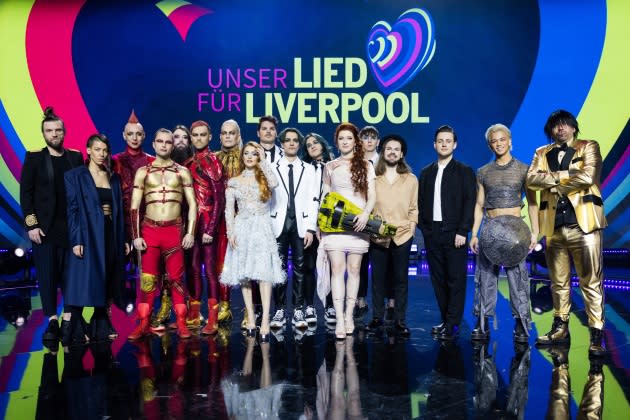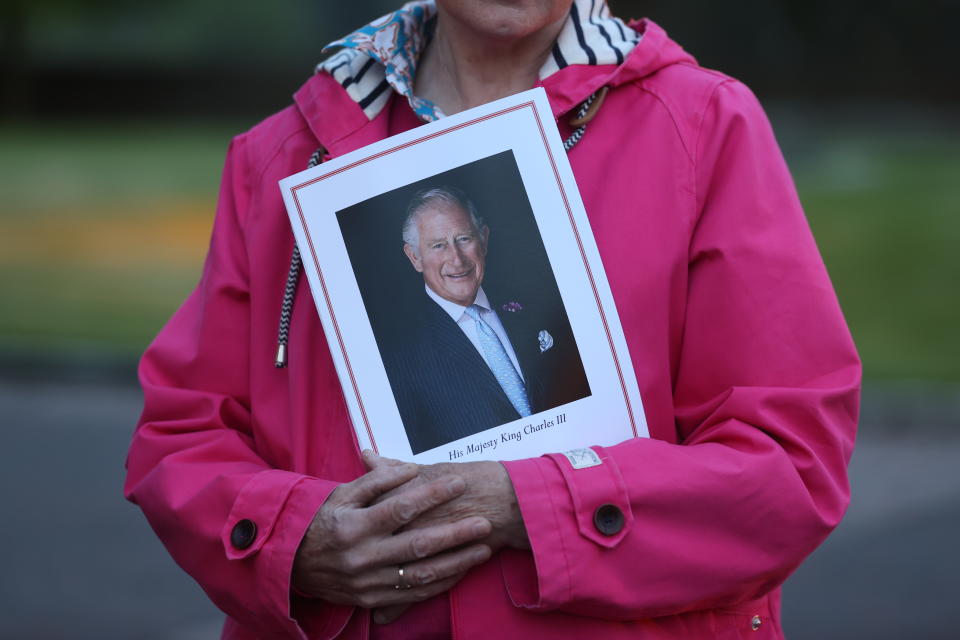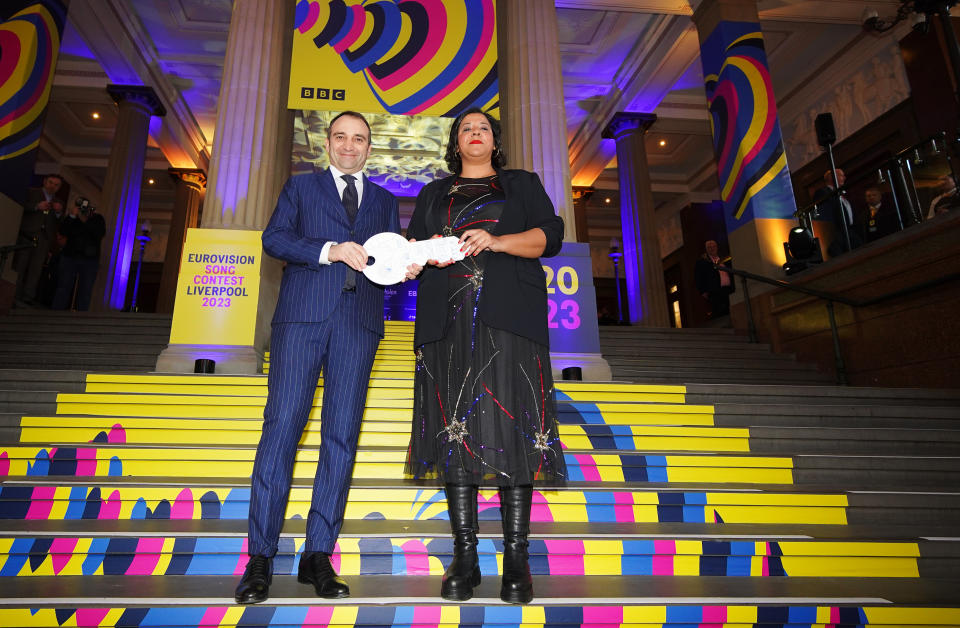The King’s Coronation & Eurovision: How The BBC Is Gearing Up For Its Biggest Week Of Live Programing In More Than A Decade
- Oops!Something went wrong.Please try again later.
- Oops!Something went wrong.Please try again later.
- Oops!Something went wrong.Please try again later.

You wait 70 years for a Coronation and 25 to host the Eurovision Song Contest and then the two come along at once.
Over the next eight days, the BBC will air two of its biggest live events of the past generation and the corporation has spent months gearing up for celebrations that are estimated to cost roughly £125M ($157.1M), the brunt of which is going towards King Charles III’s Coronation – kicking off tomorrow. There is also the small matter of the BAFTA TV Awards, taking place the day after Eurovision next weekend.
More from Deadline
Historian David Starkey Claims Prime Minister Rishi Sunak Is Not "Grounded" In British Culture
BBC Defends Acting Talent Competition Series After Performers Compare It To 'The Hunger Games'
Multiple BBC execs have told Deadline that the coming week will be its biggest for live programing in more than a decade, going back to the summer of 2012 when the public broadcaster hosted London Olympics coverage and Queen Elizabeth II’s Diamond Jubilee.
“This is what you get into TV for,” says Kate Phillips, the corporation’s recently-appointed Director of Unscripted, who is overseeing the events and says the next seven days will be the BBC’s “biggest week of my lifetime in terms of planning and complexity.”
Two contrasting acts of fate have led us to this week. Last May, the UK finished second in Eurovision but soon after took on hosting duties as winners Ukraine were unable to front, while, in September, Charles’ mother Queen Elizabeth passed away and the Coronation was set by the Royal Household for eight months later.
When she took the job last May, the BBC didn’t know it was hosting either event but Phillips’ detailed her ambitions in her second round interview with Chief Content Officer Charlotte Moore to oversee Eurovision and her wish has come true in less than a year.
“It’s definitely my biggest challenge but I love a challenge,” she says. “We’ve got so many other platforms and outlets to provide coverage for and as a result this becomes even bigger. But the funeral was a massive challenge because we only had 11 days to plan so it’s not like we haven’t done stuff of this scale.”
Phillips, who reveals she was called up for jury service during the Eurovision semi-final week and has had to be relieved, has spent the past months chairing steering groups for both events with senior execs from the likes of the news, radio and digital divisions. She has, meanwhile, been doing her best to focus on the day job, which encompasses the likes of documentary, entertainment and fact-ent commissioning. “I’ve been getting to work earlier and leaving later but the adrenaline is pumping,” she explains.
Juggling multiple stakeholders including the Royal Household, the Culture, Media and Sport department, Westminster Abbey and, for Eurovision, the European Broadcasting Union, has been immensely challenging but has also taken some of the financial burden away from the BBC, while other news organizations Sky and ITN also contribute.
The two events will likely come to around £125M ($157.1M) but Phillips stresses that “it is not [the BBC] that is shouldering all the costs,” and says the corporation is paying a “reasonable amount.” She also flags King Charles’ desire for a “slimmed-down” ceremony.
“We’ve been mindful of costs and are working with others on that,” she adds. “The BBC has paid a reasonable amount and the license fee payer will see the quality on screen.”
While the BBC is set to cut around 1,000 hours worth of shows this year, Phillips says the Coronation and Eurovision will have little impact here, instead pointing to broader pressures such as market inflation. Her unscripted division is still making big bets, she says, such as a second season of The Traitors and new entertainment format Destination X.
Crowning the King
The BBC will provide around eight hours of Coronation coverage Saturday and is putting on a Coronation Concert featuring Tom Cruise, Ncuti Gatwa and Joan Collins on Sunday, while it is the host broadcaster for the Saturday ceremony and will be providing the feed for all networks from inside Westminster Abbey. Beginning around 10.20 a.m. GMT (2.20 a.m. PT), a King’s Procession will journey from Buckingham Palace to Westminster Abbey. Afterwards, the newly-crowned King and Queen will greet crowds from the Buckingham Palace balcony for six minutes while dozens of military planes fly past.

Claire Popplewell, the multi-BAFTA winning BBC Studios Creative Director who has overseen the likes of the Queen’s funeral and Prince Harry and Meghan Markle’s wedding, says her team has been “light touch planning” for the Coronation since the funeral and ramped up from Christmas onwards.
BBC Studios will have 150 cameras placed across 17 locations down the procession route and in temporary studios. There will be 19 OB production operations deployed across London, capturing the “largest UHD coverage attempted for any single event to date,” according to the BBC.
Striking the right editorial tone is crucial and Popplewell says remote technology has been deployed along the way to keep things as “intimate and unobtrusive” as possible, coming a few months after the BBC was roundly praised for its funeral coverage.
“It all comes down to storytelling,” she adds. “We have a seven-hour live broadcast and, while it is a moment of national celebration, there is also gravitas and solemnity. During the funeral we made the decision to be quieter.”
Meanwhile, the BBC is attempting to put on its most accessible event of all time, with a signed version on BBC Two and accessible coverage for people who are blind or partially sighted via the Red Button.
Popplewell has for weeks been working closely with the Royal Household and says the scale of the event and its number of stakeholders can’t be overestimated.
Eyebrows were raised when Buckingham Palace was reported to have been given a veto on the Queen’s funeral footage last year but Phillips says the agreement will be different for a celebration like the Coronation, which has been in planning mode far longer than the funeral.
Phillips is attempting to remain calm in the face of the mounting list of things that could go wrong including the potential for protests and disruptions, with the Coronation coming a few days after a man threw shotgun shells into the grounds of Buckingham Palace, causing a security disturbance.
Eurovision heads to Liverpool

The last time the UK hosted Eurovision it had the previous year won for Katrina and the Waves’ Love Shine a Light. In a break with tradition, this year’s competition is being hosted by the nation that didn’t win the 2022 competition but is deputizing for Ukraine.
It took several months for it to become clear that Ukraine couldn’t host, meaning the UK started on the back foot. EP Andrew Cartmell is the man charged with working double speed to catch up and has been across all the coverage – which will beam from the Liverpool Arena next Saturday night – since mid-August. He is overseeing a crew of more than 1,500 along with another circa-2,000 volunteers.
Things have ramped up massively in recent weeks with seven weeks worth of rehearsals with all 37 countries as almost 1,000 people descend on the city famed for birthing The Beatles. A crescendo will be hit next week with nine rehearsals and the three live shows (two semi finals and Saturday’s final) across seven days.
The BBC has always been clear that the Liverpool event is first and foremost a Ukrainian culture celebration and Cartmell says this “adds responsibility.”
To mitigate any potential issues, Cartmell has been in regular dialogue with the Ukrainian public broadcaster since August, while Ukrainian creatives have been involved with every stage, including host – singer Julia Sanina – music composition and sound tech.
“One of the great things about Eurovision is that you have eight hours of TV to play with,” says Cartmell. “We have the opportunity to cover off lots of things and are striking a balance between representing Ukraine and Liverpool.”
Phillips has been on many of Cartmell’s Zoom calls with his Ukrainian counterparts and, while Eurovision is ultimately a celebration, she says the BBC will not shy away from broaching the difficult topic of the war, which has been going for nearly 15 months.
“We can’t be overtly political but at the same time you can’t not mention it because it is the reason we are hosting,” she adds. “The BBC is managing this fine line well and the Ukrainians understand that and are happy.”
In recent weeks, the corporation has been mired in controversy over the Gary Lineker impartiality row and the resignation of Chairman Richard Sharp, but Phillips is bullish that the broadcaster is in a good place and doesn’t need to put on two ginormous events in order to prove its worth.
“You think back to when Channel 4 was being privatized and all the commissioners I know just carried on as usual,” she adds. “When I chat to people at parties or on the street they don’t ask me about impartiality or Richard Sharp, they just tell me which shows they like.”
In nine days time, an exhausted Phillips may just be basking in a few BAFTA TV wins and will be hoping one of the BBC’s biggest live weeks for decades has gone off without a hitch.
Best of Deadline
2023 Premiere Dates For New & Returning Series On Broadcast, Cable & Streaming
WGA Strike Picket Line Locations List And Times Set For Los Angeles & New York
Sign up for Deadline's Newsletter. For the latest news, follow us on Facebook, Twitter, and Instagram.

